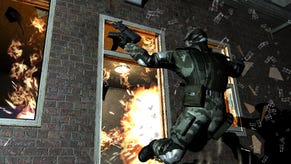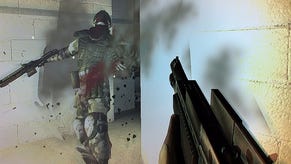F.E.A.R And Loving In San Francisco
We grab an exclusive one-to-one interview with Monolith's technology chief Kevin Stephens about the most exciting first-person shooter of the year.
If you're into first-person shooters and you have a PC, then there's no doubt that Monolith Productions' F.E.A.R will be one of the games right at the top of your Most Wanted lists for 2005. That's certainly what we thought when we last played it - with poor Tom getting excited enough to write about the opening section and the multiplayer element after a recent trip to Vivendi's Parisian HQ. We got our first opportunity to play other areas of the single-player element recently and will be looking to bring you our first impressions of the game later this week. But first, we grabbed a one-to-one with Kevin Stephens, Monolith's director of technology.
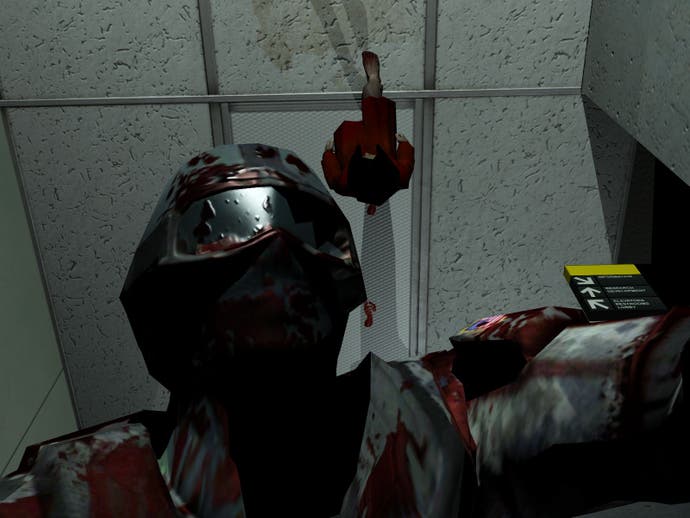
I oversee the action divisions in the technology group and I lead the technology for the two games we have in development - F.E.A.R and Condemned.
To sum it up, it's really the visceral over the top cinematic action. We really set out to capture the feel of being in an action movie and I think we've done a pretty good job of that. There's obviously the twists, the horror element, which I think kind of really sets it apart. I think it's a little bit fresh; it's something that hasn't been done in the first-person shooter genre, and so I think that it's something that's familiar to people, but hopefully it'll be a new experience, and an experience they'll really enjoy.
The lead game designer was really the person that said "this is the type of horror I'd like to focus on," and I had some exposure through some of it, personally, and through the international film festival I saw Ring Zero - my girlfriend was a big Ring fan. So I knew right away, "yeah that's scary stuff," so the American version of Ring came out, and I'd seen movies like Dark Water, and the lead game designer brought in Juon and The Eye, and the more you watch, the more you start to see patterns, but at the same time they're all just so freaky. They really are different to American horror movies, so yeah, I did a lot of research!
I do, but at the same time we do use tried and true methods that people are used to in a lot of horror movies, but I think that some of the freakier elements that are in the game you can trace back direct to specific moments in film.
Well you've played the second level, and that shows a taste. I don't think it's total craziness. I don't really want to give examples, because I don't want to spoil it.
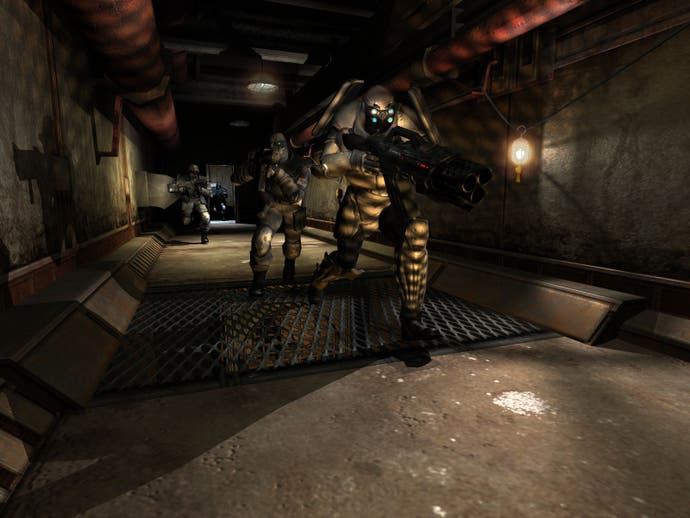
You're part of this team that is basically assigned to the Delta Force units, you work with them, and that's part of the story I don't really want to give away too. You don't really know what this team is or what your role on it is.
Right. The big part of it is that the player's kind of thrown into this, and it's like you don't really know what's going on and it's that kind of element that puts you off, because you're like "I don't really know what I'm supposed to be doing, and I don't really know what's going on," and so you don't start "oh, I know exactly what to do", so you are already a bit, like, off. So then when weird things start happening - I don't want to give anything away but things start happening and I think that sets the tone a little bit. You never quite feel comfortable, and I think that helps add to the tension in the game.
There are so many games out there it's hard to say, "we did this, no one else has done that," but some of the things we focused on that we haven't seen done a lot that we thought were pretty important to immerse players. Everything comes back to cinematic combat and really immerses the player in the experience. One of the things was first-person body - which some games have done, we're not going to claim we were the first to do it - where you can see your entire body, but we use it a lot more than other games because we have the dynamic lighting, the shadowing, and you see your own shadow, and there are some horror moments where you can be frightened by your own shadow.
The other thing is with the melee, being able to see your arms and legs. It's one of those strange things where in first-person shooters, most first-person shooters you have these guns like this [points hands out in the shape of a gun in front of him] floating here, and people don't really think about it. "Yeah I've got a gun." But you look down and there's nothing there. So I think once you play a game where you look down and see your body it's hard to go back to a game where it doesn't have the body. To me that's just evolution. All first-person shooters are going to have to do that. And having your body and your shadow roots you in the environment where you feel like you're in the world.
Well, there are both. Monolith is known for games with a story, so we definitely have a story and that's a very important part of it, and you have to be invested in the story to really care about the elements that are going on and care about if there are people around you that are having problems. If you don't care about those characters, then who cares if something happens to them? So, yes, the story is definitely important. The narrative's slightly different than some of the more recent Monolith games because we really try and keep the player immersed in it, but at the same time the player doesn't have a voice. I mean, you can't talk.
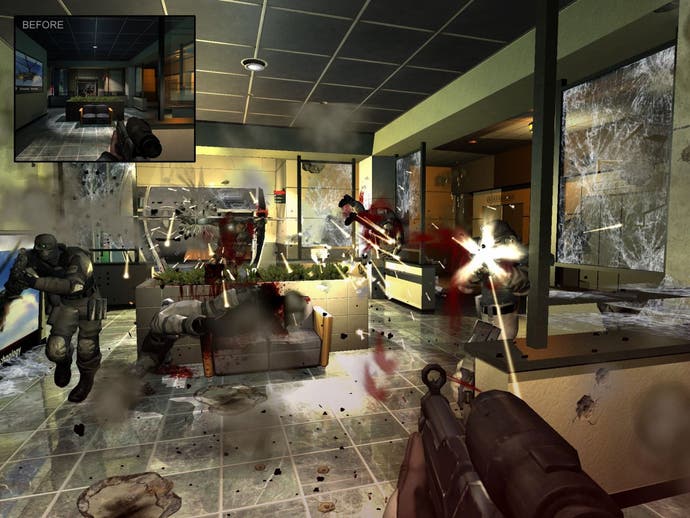
Yeah, it's very similar. I think the big difference is we don't name our character. We really want you to feel like it's you. Me personally, in Half-Life 2 it's me playing the game for an hour and then someone walks up to me and says "hey Gordon", and it takes me out of it; I'm not Gordon. So we definitely want to avoid that, and we think we can. We don't need to name the character, we can talk directly to the character, but it is challenging, it's hard to do, but it's important as we want you to feel like you're in the game. It's you, it's first-person, the whole point of it is that it's first-person; it's you.
As far as technology to support that, there's a fair amount with the animation system for the first-person player body because when you have a gun model floating here it's fairly easy to animate it, but when you have a whole body and you have melee moves it's fairly complex, so you end up with a lot of the problems you have in a third-person game but in first-person, so that's been challenging, but it's been rewarding. It definitely increases the feeling of actually being in the game.
The thing you have to understand about it is that it started out as an action game from the very beginning, and so things like the slow motion, even the horror elements came later. Those were kind of the spice to the game. Action seems kind of boring, I think every game has action, so we were like 'we want to raise the bar of action', and it was like "okay, well that's great, but doesn't every game try to raise the bar?" and so we thought "how do we differentiate it, how do we make it special?" With the slo-mo, a lot of action movies slow down time and emphasise things, so we thought let's try it and see how it works - it worked great in Max Payne, it worked great in The Matrix, it's worked great in movies pretty much forever - so it wasn't a new concept. So we tried it and we really liked it, and we liked it enough that we started making it more of a gameplay feature, and thought hey, this isn't something we do once in a while, let's actually let the player control it - it's really fun to be able to slow down time, and it adds a dynamic way to kind of emphasise the action which was the whole core key element in the first place. Pretty much our whole design philosophy comes from that. Here's the goal, how are we going to get to that goal, what can we do to improve upon what's out there and kind of make it our own.
It's kind of a combination of both. In a perfect world you start with a game concept and you build the technology for it. In the real world you have a core set of technology that you're going to have to leverage if you're going to ship the game in less than six years. You can't start from scratch, and we really don't like to work on a game for longer than two or three years. It's hard, after a while you kind of get sick of it to be honest, so we always leverage what we had before, and we knew where we wanted to take the technology, and we knew where the industry was going, and it was pretty clear to us, and so knowing that we took a step back and said this is the kind of game that we want to make, what kind of concessions are we going to have to make to have that work within this technology, and so there's back and forth. There's always back and forth.
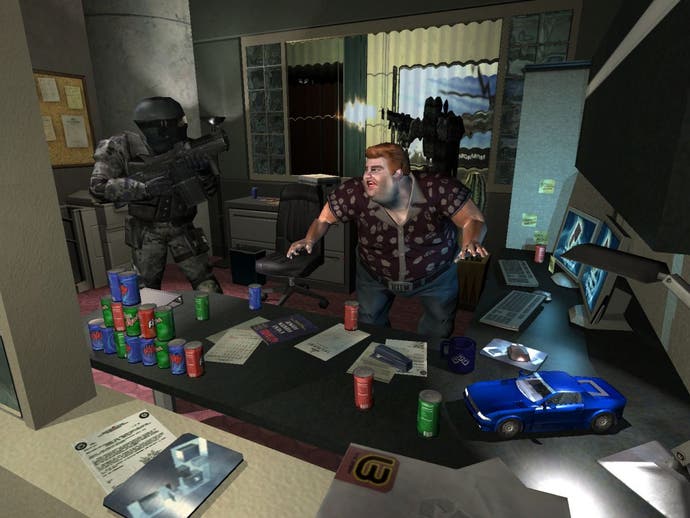
No, I can't [laughs] ["You're hoping!" jibes the VU PR rep]
[More nervous laughter] We hope there's more F.E.A.R, that's all I can say!
It's hard, there are so many variables that go into commercial success, and even critical success that I wouldn't want to hazard a guess on whether people are going to like it or people are going to buy it. We set out to make something that's a compelling experience that a game player would really enjoy and remember. It's a big thing; we want them to remember it. It's no good playing a game and then five days later forget what the game was about, so we wanted to have a lasting impression but that doesn't always mean that people are going to buy the game or we might not make what they like. You never know. The fact that a lot of people are excited about it, and people think it's going to be a success is nice but really we just set out to make the best game we can.
Well, you know, our core technology and our core expertise is on the PC so that definitely has something to do with it, and to be honest moving from PC to console - even ignoring the technical issues - a lot of publishers are very sceptical of PC developers making console games, so it's a hard sell. We have wanted to make console games for a long time, and Condemned is our first game for next-generation consoles, and really the only way it happened is that we took our own money aside and we built to show "look, we can make a console game that's going to be compelling".
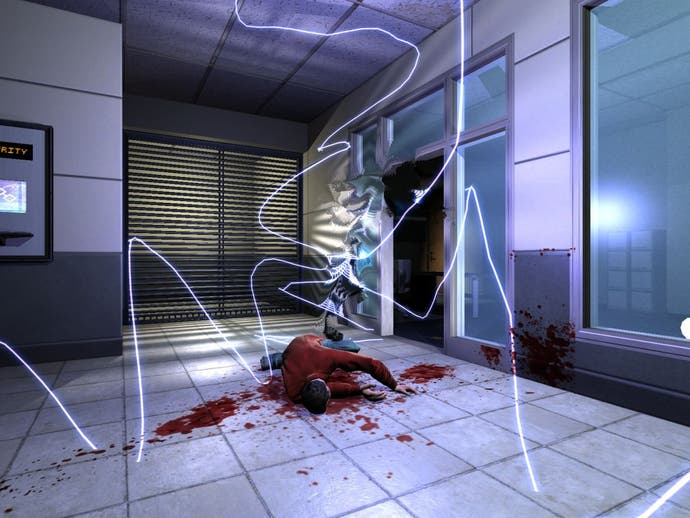
It's expensive; there are millions of dollars you're risking.
No. Matrix Online is! But that's a MMO, those are expensive games to make. But yeah, Monolith is definitely going onto next-generation consoles, but we're not giving up the PC. The big thing for us is that we make technology for our games and we need to always have to have a cutting edge game on PC to push technology. The PC will always be ahead of consoles. Consoles might be ahead for a month or two, but the PC will quickly be ahead of that. It's important to us, even from the concept of just building technology, that we always have a triple-A PC game in development at all times.
Yeah we're using Havok physics and Bink for our splash screen movies, there might be others, but apart from that it's pretty much our own technology.
To be honest people are all over the place. Some people say "It's perfect, don't change it", other people think it's too fast, other people think it's too slow. It goes the full gamut. I think they've done an outstanding job. It's been hard; a lot of people on the team want different things. It's been a long iteration, we've got the core concept for the game, [but] how do we make that work in multiplayer, and we don't want to be exactly like another game. It's like "why would people play our multiplayer if you could go play it over here?"
I think people will play it because it has elements that are tactical, you have the aiming on the guns, it's faster paced, and it has visceral carnage that you just don't get in any other multiplayer experience. I mean it is a different experience. For me the big thing is the future of it; I mean we're going to ship the game but we're going to support it, so there's going to be more game modes, it will grow. Whatever we ship it's going to get better.
Well we have a slow motion mode. We have a power-up that you can pick up. We have deathmatch, team deathmatch, elimination, and so in the team modes, we have team slo-mo where you pick up the power up, and once it's charged up, whoever picks it up can activate slo-mo and it slows down the entire game. The people who are on the team that activated the slo-mo have an advantage over the other team and it's different. It's just not something you can get in any other multiplayer experience. It's really fun.
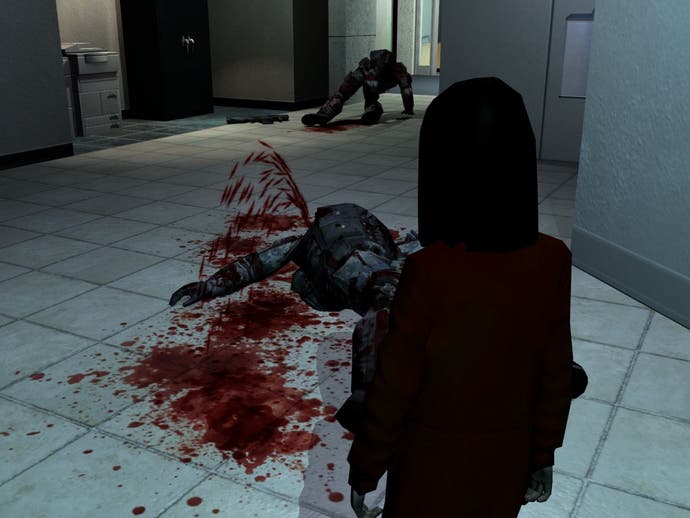
One side is slowed down - I think they have a 20 per cent speed advantage over the slower team. It's enough so that it's noticeable. You're shooting faster than they are, they're shooting really slow, and when you're on the team that doesn't have it, it's like "oh no", but at the same time if you get a kill when you're at a disadvantage, it's a really satisfying thing. The weapon effects all change in slo-mo; it's an experience that's very reminiscent of a movie like The Matrix where you're going in slo-mo and there are bullets flying everywhere, and there's debris flying and explosion and guys dying and rag-dolling and blood spraying. It's an experience you can't get in any other game.
I dunno. Maybe. It's hard to say. The slo-mo came as a logical addition to supporting this combat, so if another game has that same kind of core, like visceral over the top combat, then maybe, yeah, I could see them doing that, but just to add it as a feature for a lot of games it wouldn't make a lot of sense. It would feel tacked on. We don't look at it like we're doing something that no one else has thought of, it's more like it fits really well in our game, so we did it.
For me it's always the next game that I'm most proud of, and I think that when you release a game and you're not more proud of it than the last game you've failed somewhere. F.E.A.R has had a ton of challenges; it's new technology, it's brand new IP - which is hard to even get the publisher behind in the first place. It took us a long time to nail down "what is this universe we're making", and so all of those challenges along with a bunch of people that have worked together for a long time (which is good and bad), it's definitely the game I'm most proud of, and I'm really super proud of this technology team. They're incredible.
It's the same with every game. I think with F.E.A.R, to be honest, the features we thought we were going to have to leave out have gotten into the game. I think so far as all the games I've worked on I'd say it's more feature-rich than any other game as far as the core features. It's like slo-mo; we really didn't think we were going to be able to make that work, and once we got it working in single-player we were like "oh this would be great in multiplayer," and I thought "there's no way we'll get that to work in multiplayer" and then we did. That's why I'm so proud the team; they've nailed the big features. It all the small little things that we could take or leave that didn't make it.


